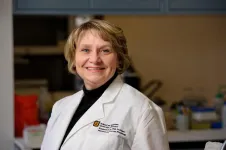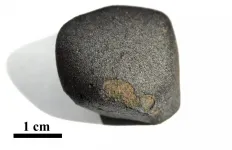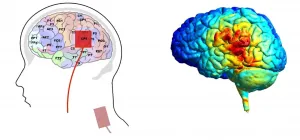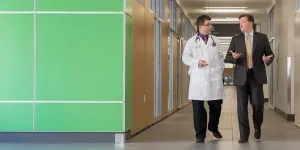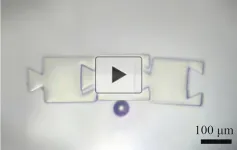(Press-News.org) Older adults are managing the stress of the coronavirus pandemic better than younger adults, reporting less depression and anxiety despite also experiencing greater general concern about COVID-19, according to a study recently published by researchers at the UConn School of Nursing.
Their somewhat paradoxical findings, published last month in the journal Aging and Mental Health, suggest that although greater psychological distress has been reported during the pandemic, older age may offer a buffer against negative feelings brought on by the virus's impact.
"When you think about older adulthood, oftentimes, there are downsides. For example, with regard to physical well-being, we don't recover as well from injury or illness as we get older," says Natalie J. Shook, a social psychologist, associate professor, and principal investigator for the study. "But, on average, older adults tend to have better emotional well-being than younger adults. They tend to report a more positive mood, are happier and more satisfied with life. And so we wanted to look at this question, with regard to COVID, because we know older adults are much more likely to have serious complications."
While Shook and her team found a significant positive association between the likelihood of contracting COVID-19 and feelings of anxiety in study respondents between the ages of 18 and 49, that relationship did not exist for older participants. The finding, the researchers wrote, aligns with other research showing better emotional management of stress in older age.
"What we see within our data is that there seems to be kind of this age buffering where, despite greater concerns about COVID and rightly so, our older adults are not reporting higher rates of anxiety or depression than younger adults," Shook says. "The data suggest that older adults are better able to regulate their emotions and better able to cope with all of the stress and uncertainty right now."
Older adults may be choosing to focus more on the positives of the current moment, the researchers write, but the risks of the virus don't appear to be lost on them. Older age was related to greater concern about COVID-19 and greater perceived likelihood of dying if they contracted the disease.
Shook says the findings present an opportunity for policymakers and public health officials to learn from the ways older adults manage stress and deal with unusual circumstances to inform positive mental and behavioral health strategies for other age groups. Potentially, mindfulness practices or exercises that focus on the present moment, rather than focusing on the future or worrying about the past, may help support mental health.
Shook is also quick to say the findings don't diminish the need to check in on older adults to ensure they're managing well.
"Older adults still experience depression and anxiety, and it's not that we're not seeing that; we're just seeing less than in our younger adults," she says.
But the researchers also warned that perceiving a higher risk of COVID-19 infection generally predicts greater engagement in preventative health behaviors and that, if older adults perceive a low risk of infection, they may be less likely to follow behavioral guidelines meant to limit potential exposure.
"[I]t is important to emphasize to the public how highly contagious COVID-19 is, particularly highlighting that those of older ages are more vulnerable to contracting the disease," they write.
INFORMATION:
The findings are part of a year-long examination of how behavior and social attitudes change, and what factors influence those changes, when people in the United States are faced with the threat of widespread disease. Supported by a National Science Foundation grant, the study is tracking the well-being, feelings, and behavioral practices of about 1,000 individuals across the United States.
This study is supported by NSF Award No. 2027027. UConn's Institute for Collaboration on Health, Intervention, and Policy (InCHIP) is the managing institute for the grant. Please visit nsf.gov for more information, and visit chip.uconn.edu to learn more about InCHIP and its Rapid Response Proposals to Address COVID-19.
Not long after the sun goes down, pairs of burying beetles, or Nicrophorus orbicollis, begin looking for corpses.
For these beetles, this is not some macabre activity; it's house-hunting, and they are in search of the perfect corpse to start a family in. They can sense a good find from miles away, because carrion serves as a food source for countless members of nature's clean-up crew. But because these beetles want to live in these corpses, they don't want to share their discovery. As a result, burying beetles have clever ways of claiming their decaying prize all for themselves. In new research published in The American Naturalist, researchers from UConn and The University of Bayreuth have found these beetles recruit microbes to help throw rivals off the scent.
Immediately following ...
The NFL playoffs are underway, and fans are finding ways to simulate tailgating during the COVID-19 pandemic. Football watch parties are synonymous with eating fatty foods and drinking alcohol. Have you ever wondered what all of that eating and drinking does to your body?
Researchers from the University of Missouri School of Medicine simulated a tailgating situation with a small group of overweight but healthy men and examined the impact of the eating and drinking on their livers using blood tests and a liver scan. They discovered remarkably differing responses in the subjects.
"Surprisingly, we found that in overweight men, after an afternoon of eating and drinking, how their bodies reacted to food and drink was not uniform," said Elizabeth Parks, PhD, professor of nutrition and ...
University of Arizona researchers read between the lines of tree rings to reconstruct exactly what happened in Alaska the year that the Laki Volcano erupted half a world away in Iceland. What they learned can help fine-tune future climate predictions.
In June 1783, Laki spewed more sulfur into the atmosphere than any other Northern Hemisphere eruption in the last 1,000 years. The Inuit in North America tell stories about the year that summer never arrived. Benjamin Franklin, who was in France at the time, noted the "fog" that descended over much of Europe in the aftermath, and correctly reasoned that it led to an unusually cold winter on the continent.
Previous analyses of annual tree rings have shown that the entire 1783 growing season for the spruce ...
A meteorite that fell in northern Germany in 2019 contains carbonates which are among the oldest in the solar system; it also evidences the earliest presence of liquid water on a minor planet. The high-resolution Ion Probe - a research instrument at the Institute of Earth Sciences at Heidelberg University - provided the measurements. The investigation by the Cosmochemistry Research Group led by Prof. Dr Mario Trieloff was part of a consortium study coordinated by the University of Münster with participating scientists from Europe, Australia and the USA.
Carbonates are ubiquitous rocks on Earth. They can be found in the mountain ranges of the Dolomites, the chalk cliffs on the island of Rügen, and in the coral reefs of the ...
Transcranial direct current stimulation (tDCS) is a non-invasive method of brain stimulation, in which electrodes are applied over certain places on the scalp, creating a weak electric field. It is currently used for a variety of purposes: from treating depression and pain syndromes to better acquisition of new words and even sports techniques.
During stimulation, the active electrode can transmit a positive or negative electrical charge. In the former case, this stimulation is called 'anodal'; in the latter one, it is called 'cathodal'. Researchers believe that anodal tDCS generally leads to depolarisation of neurons, which increases the likelihood of their excitation when new information arrives. Cathodal ...
As the United States struggles to control record-breaking increases in COVID-19 infections and hospitalizations, the roll-out of two approved vaccines offers tremendous hope for saving lives and curbing the pandemic. To achieve success, however, experts estimate that at least 70 to 90 percent of the population must be inoculated to achieve herd immunity, but how can we ensure folks will voluntarily receive a vaccine?
Both vaccines require two injections. Pfizer-BioNTech's second dose must be given 21 days after the first and Moderna's second dose must be administered 28 days after the first. While public health and infectious disease experts have discussed strategies to enhance adherence, including the potential use of financial incentives, ...
One more piece of the puzzle has fallen into place behind a new drug whose anti-cancer potential was developed at the University of Alberta and is set to begin human trials this year, thanks to newly published research.
"The results provide more justification and rationale for starting the clinical trial in May," said first author John Mackey, professor and director of oncology clinical trials in the Faculty of Medicine & Dentistry. "It's another exciting stepping stone to finding out if this is going to be a new cancer treatment."
The drug PCLX-001 is designed to selectively kill cancer cells by targeting enzymes ...
Better grades thanks to your fellow students? A study conducted by the University of Zurich's Faculty of Business, Economics and Informatics has revealed that not only the grade point average, gender and nationality peers can influence your own academic achievement, but so can their personalities. Intensive contact and interaction with persistent fellow students improve your own performance, and this effect even endures in subsequent semesters.
Personality traits influence many significant outcomes in life, such as one's educational attainment, income, career achievements or health. Assistant Professor Ulf Zölitz of the University of Zurich's Department of Economics and Jacobs Center for Productive Youth Development has investigated how one's own personality affects fellow students.
The ...
Robots are widely used to build cars, paint airplanes and sew clothing in factories, but the assembly of microscopic components, such as those for biomedical applications, has not yet been automated. Lasers could be the solution. Now, researchers reporting in ACS Applied Materials & Interfaces have used lasers to create miniature robots from bubbles that lift, drop and manipulate small pieces into interconnected structures. Watch a video of the bubble microrobots in action here.
As manufacturing has miniaturized, objects are now being constructed that are only a few hundred micrometers long, or about the thickness of a sheet of paper. But it is hard to position ...
HOUSTON - (Jan. 20, 2021) - Once upon a time, seasons in Gale Crater probably felt something like those in Iceland. But nobody was there to bundle up more than 3 billion years ago.
The ancient Martian crater is the focus of a study by Rice University scientists comparing data from the Curiosity rover to places on Earth where similar geologic formations have experienced weathering in different climates.
Iceland's basaltic terrain and cool weather, with temperatures typically less than 38 degrees Fahrenheit, turned out to be the closest analog to ancient Mars. The study determined that temperature had the biggest impact on how rocks formed from sediment ...
